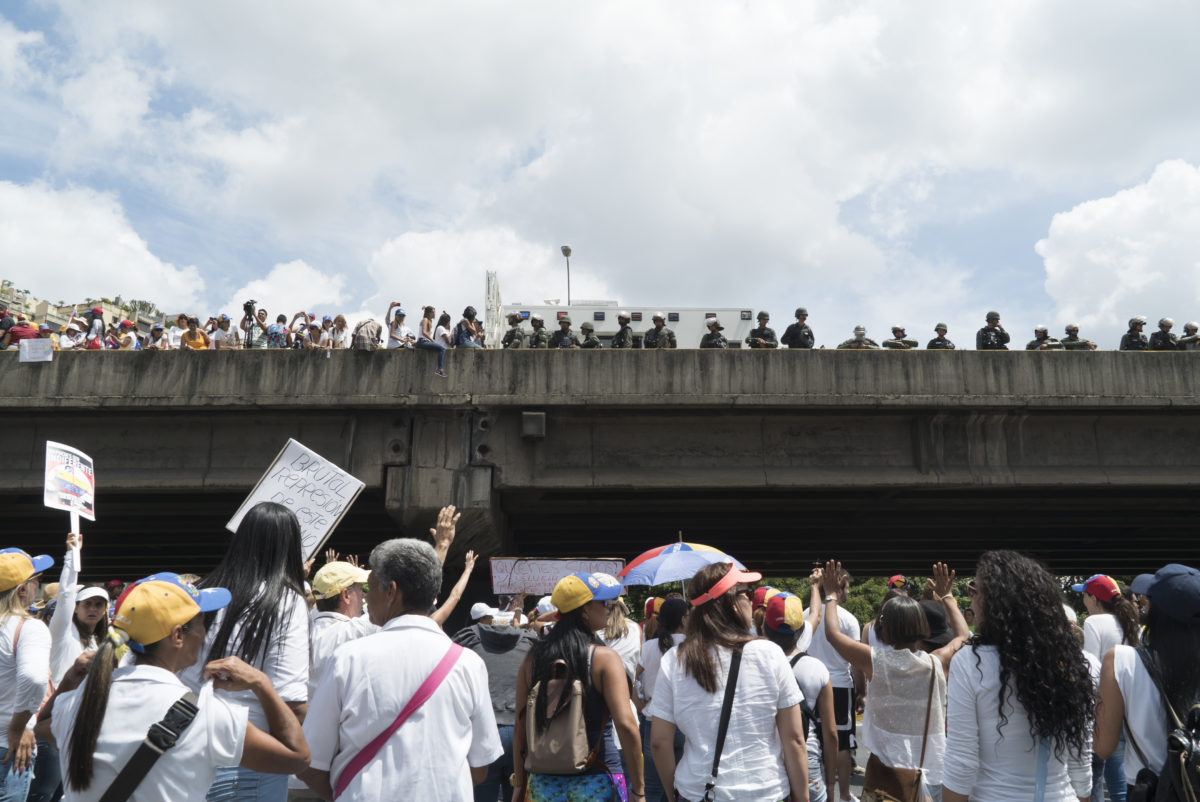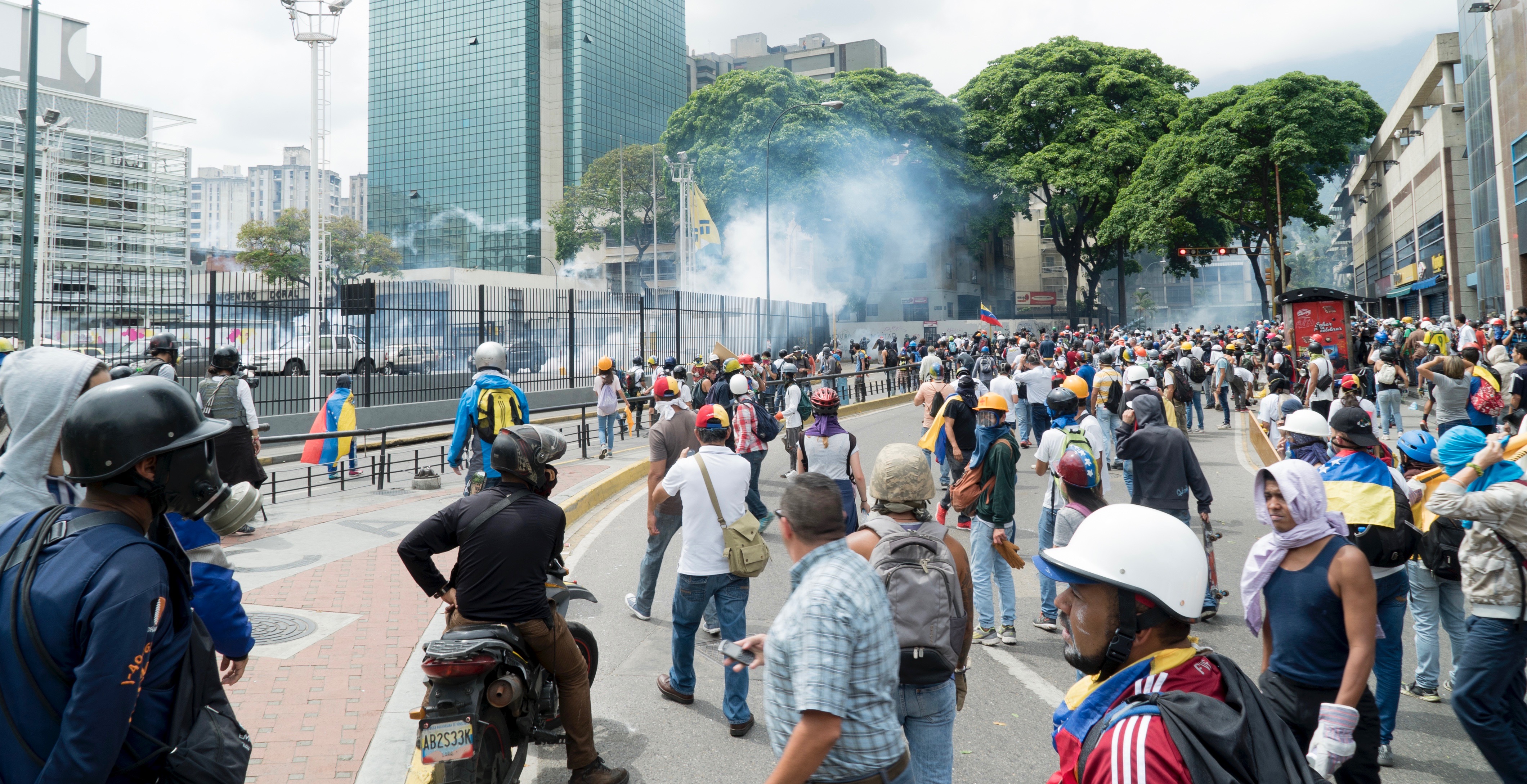New Schoolers and Venezuelans came together in support of the country’s ongoing movement against its crisis at Tishman Auditorium on May 11th.
In white T-shirts, blue jeans and borrowed caps with the Venezuelan flag on it — the usual rally attire in the South American country — students from all nationalities banged pans in front of a camera for 3 hours.
Parsons seniors and Venezuelans Maria Laura Camero, BFA product design, and Mariana Del Nogal, strategic design and management, organized the event, which summoned anyone interested in the cause to visit University Center´s Tishman Auditorium between 1:00 p.m. and 4:00 p.m. to participate in a multimedia campaign to raise international awareness for the crisis in their home country. The campaign was titled #BangThatPan, in honor of the Venezuelan Cacerolazo, a form of protests in which citizens grab a pan and continuously hit it hard to make loud noise in form of protest.
Around 25 Americans, Mexicans, French, Egyptians, Colombians, Peruvians, Brazilian and of course Venezuelans — both New Schoolers and non-New Schoolers — joined Camejo and Del Nogal for the event.
“The idea is to viralize the crisis because so many people abroad have no idea of what is going on,” Del Nogal said.
Venezuela has been going through continuous unrest since April 1. The country has seen large protests of millions of people as well as smaller demonstrations of a few thousands every single day since the unrest began. The government continues to tighten its grip responding with brutal violence that by May 22 had resulted in 38 deaths due to injuries by firearms shot by police forces. The total of deaths in protests and lootings by that date amounted to 60, some from tear gas suffocation, electrocution or yet to be identified shooters.
At first, people went to the streets to show discontent after the Supreme Court overruled the democratically elected National Assembly. This ruling, which constitutional experts defined as a self coup, was overturned three days after. Regardless, the majority of Venezuelans continued to show their discontent for the government through street protests, mainly to demand immediate elections, the release of political prisoners and for international humanitarian aid, which is currently barred from the country.
The government however responded by sending the military to stop these protests with tear gas cans, water canyons and pellet shot guns.
Police efforts to quell the discontent turned deadly when an officer from the National Bolivarian Police shot Jairo Ortiz, 19, on April 6, according to local digital news outlet Runrun.es. Since then, 60 more people have been killed, and more than 1,600 were arrested in April, according to rights group Penal Forum.
Members of both parties in the United States Congress showed their disapproval towards President Nicolas Maduro´s power grab of the Assembly in late March. The State Department and the president of Organization of American States, Luis Almagro, called out the Venezuelan government for their actions. Senators Bob Menendez and Marco Rubio even called the president “an unhinged dictator.” Like them, Spain, Panama, Perú, Mexico, among others, identified the Venezuelan government’s action as an act against democracy.
The Venezuelan government has condemned protesting as an act of terrorism, refusing to acknowledge the country’s collapse.
Meanwhile, Venezuelans are trying to flee their home. According to U.S. Citizenship and Immigration data, Venezuela has the lead in political asylum requests in the U.S., with 18,155 applications in 2016. The number of applications grew by 150 percent from the previous year, and is six times higher than it was in 2014.
According to ISSS data reports, The New School currently has enrolled 39 Venezuelan students, of which 80 percent are pursuing majors in the visual and performing arts field, and 14 percent in social sciences.
Many of these students left Venezuela mainly because of the crisis and are deeply affected by the current situation in their home country.
Camejo herself left five and a half years ago. She remembers the exact date: Nov. 25, 2011. Her father was one of the many political prisoners at the time. “He did not think it was safe for our family to live in the country,” she said. The Parsons student explained that members of the Bolivarian Intelligence Service tend to harass the families of their detainees to frighten them.
Like her, architectural design junior Mayra Capriles left unwillingly three years ago because of the political and economical crisis, she said. Insecurity also played a defining role in Capriles´ immigration decision. Her home city, Caracas, has been in the top 10 most dangerous cities in the world since 2008 according to Business Insider.
Del Nogal left mainly to meet new cultures and study in a prestigious school abroad. Education in Venezuela has also taken a plunge with schools suffering budget cuts and professors quitting or fleeing the country because of low salaries in the last few years.
“It’s heartbreaking, infuriating, but above all frustrating that the crisis has only worsened in these past 15 years,” she said about the current situation in Venezuela.

Camejo said it’s difficult to see her country crumble while being so far away. “I feel helpless because I want to protest against the regime that took so much away from me, yet I live in fear that something might happen to those I love,” she said. “I live with guilt because even when I am constantly looking for ways to help, I have to go on with my life, come to school as if nothing were happening when in reality, my mind is back home.”
Most Venezuelan New School students grew up under the current regime and have little or no memory of anything else. Hugo Chavez, the leader of the Bolivarian Revolution and his ideology, “el Chavismo”, came to power in 1998, when almost all students were too young to remember. Before his death in 2013, Chavez appointed Maduro as his successor.
Many of the students want the government to step down and call elections. Some are even hopeful that after 18 years, this might be “el Chavismo´s” final days.
“Venezuelans have finally maintained a consistency in their protests that had been difficult to achieve in previous years. The crisis has gotten to a level where the country’s citizens have nothing to lose and everything to gain,” Camejo said, adding that the the country is at “tipping point.”
When she says “nothing to lose,” Camejo does not exaggerate. The current crisis has Venezuelans starving. According to ENCOVI, Survey on Living Conditions in Venezuela, in 2016 75 percent of the Venezuelan population lost more than 18 pounds because of the food shortages. It is not uncommon to find people digging through garbage for food on any given day.
The total destruction of the economy in the last 18 years has caused shortages of almost everything including food, medicines, clean water, toilet paper and even oil in the form of gasoline. This last is unbelievable, because Venezuela is the country with the biggest oil reserves in the world, according to the EIA.
For now, many Venezuelan students plan to remain abroad, but only because they consider it to be unbearable to live back home.
“If I ever have a family of my own, I would consider raising my children in Venezuela, but only if living conditions improve,” Camejo said.
Capriles, who has been working with an organization to replicate news in English, convening protests in New York, and organizing other events, like a talk in Columbia, did not think twice before saying yes when asked if she planned to return.
“Due to the economic, political and humanitarian crisis in Venezuela I would not want to go back at the moment,” Del Nogal said. “But I hope to return someday.”
Photos by Mischka Capriles







